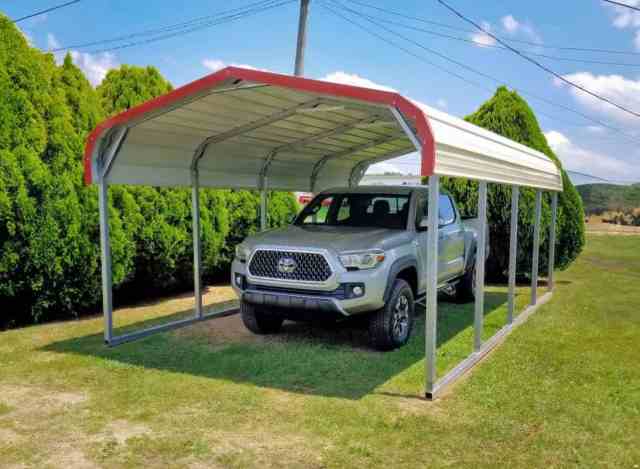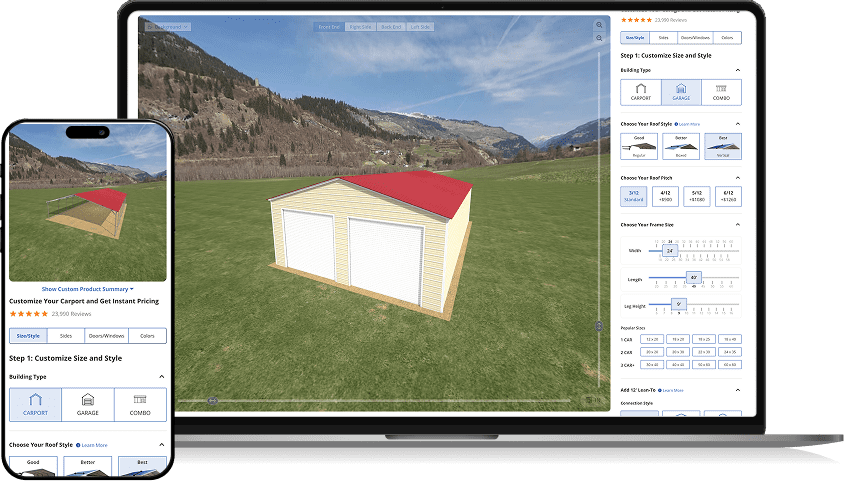A carport is an open-ended shelter that requires less space, installs faster, and is more affordable than a typical garage.
When you need to protect your vehicle from the elements, your best bet is to invest in a garage or carport. While everyone has heard of a garage, you might ask yourself: What is a carport?
A carport is an open-ended shelter for vehicles that typically takes up less space, is quicker to install, and costs less to build than a garage.
To help you decide if a carport is right for you, we’ll walk you through different types of carports, the materials you can use, their pros and cons, and how much value these additions add to your home.
What is a Carport?
A carport is an open-ended shelter for vehicles that typically takes up less space, is quicker to install, and costs less to build than a garage. These outdoor structures are a practical way to protect your car from the sun, rain, and snow without spending a lot of money.
Carports are a popular choice for homeowners who want affordable, reliable shelter for their vehicles.
Types of Carports—Exploring Carport Styles
The best carports come in all shapes and sizes. Here are some examples of the different carport styles and types you can build, classified according to different criteria.
By Enclosure
A carport can be open-sided, partially enclosed, or fully enclosed carports. The level of enclosure you choose will depend on your needs and budget. Let’s take a closer look at each type.
Open-Sided
Open-sided or regular-style carports have no walls, only a frame and a roof. This means you can protect your vehicle from rain, hail, and sun, but not extreme winds or storms.
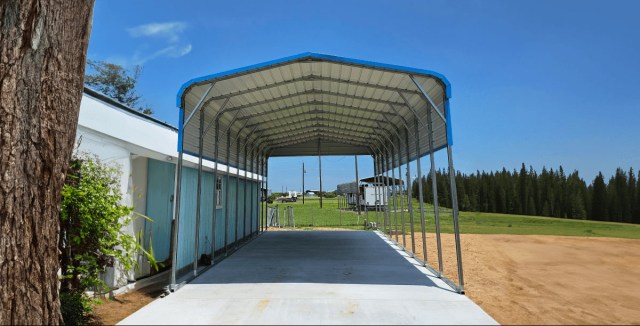
The main benefit of an open-sided carport is its affordability and quick installation time compared to those with extra walls.
Partially Enclosed
Partially enclosed carports offer more protection from the elements than open-sided carports. They have one or two walls, which can help to block wind, rain, and snow (and possibly give a bit of privacy from the neighbors).
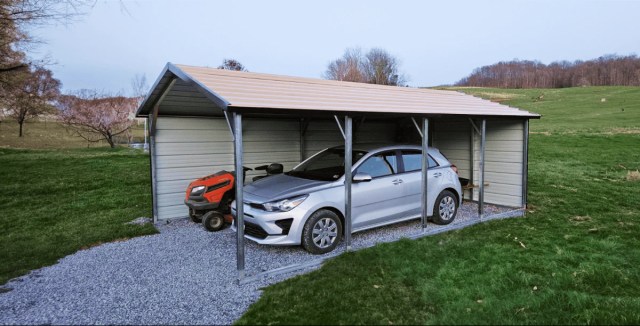
This type of carport is a good option if you live in an area with severe weather.
Fully Enclosed
Fully enclosed carports are essentially garages with large doors instead of a typical wall.
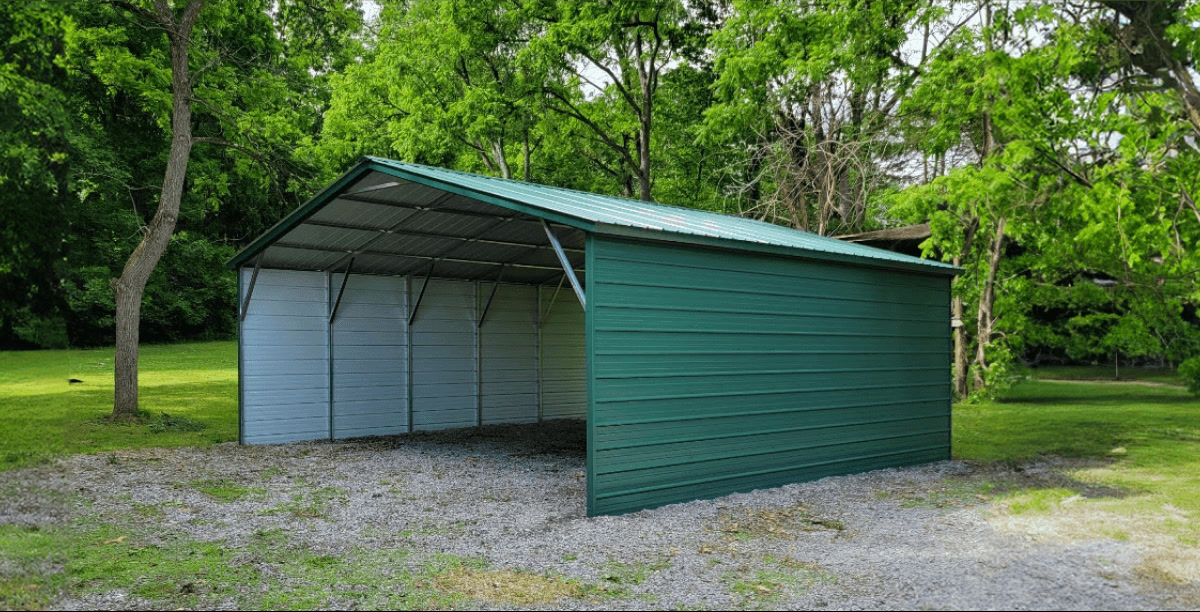
They offer the most protection from the elements, and you can also use them for storage. However, they’re also the most expensive type of carport.
By Attachment
Carports can also be classified by how they are attached to another structure or not.
Detached or Freestanding Carports
Freestanding carports are the most common types of carports. They’re similar to detached garages in that they’re not attached to your home or any other structure, giving you more flexibility in terms of placement. You can put these freestanding structures anywhere on your property as long as it meets local building codes.
Attached Carports
While most carports are standalone structures separate from any other building, attached carports are connected to your home.
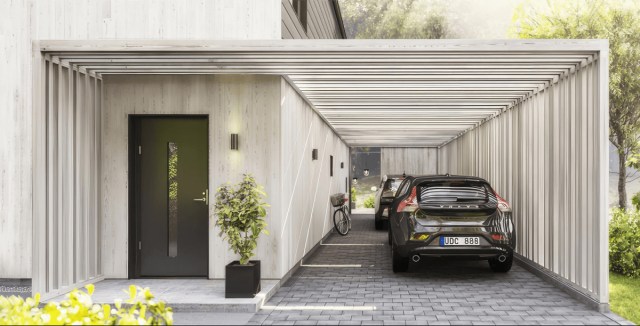
This feature makes them more convenient since you get quick, covered access to your car. It’s also a good way to discourage burglars since your car will naturally be under closer supervision.
By Roof Style
The roof style of your carport will affect its appearance, cost, and functionality. Here are some of the most common roof styles for carports.
Flat Roof
Flat roof carports are inexpensive and easy to install and have a versatile design that complements most houses.
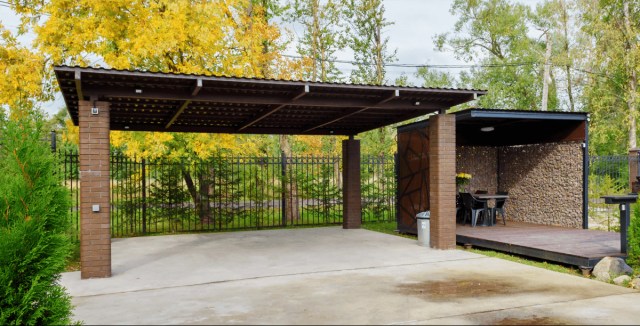
However, the biggest downside is that the flat roof makes your carport more susceptible to the buildup of water, snow, and debris, which can increase maintenance requirements.
Gable Roof
Gable roof carports have a classic A-frame shape that is popular with many homeowners.
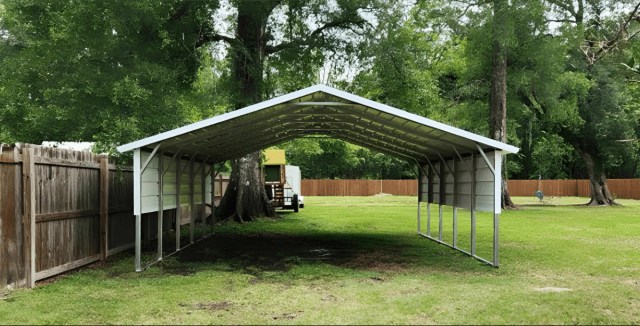
They’re good at shedding rain and snow and offer more headroom than flat-roof carports. Gable roofs are a practical choice for many people.
Arched Roof
Arched roof carports have a modern look and are very strong. They are often used for metal carports.
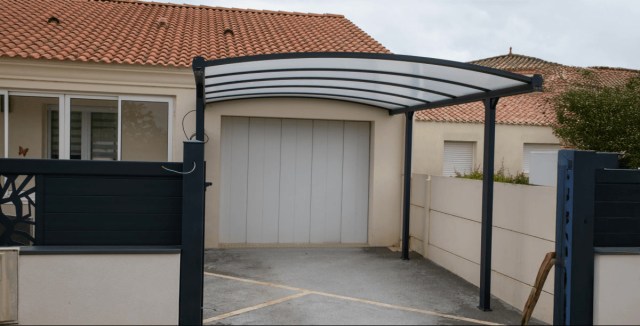
Arched roofs can be a good option if you live in an area with high winds or heavy snow.
Vertical and Boxed-Eave Roofs
Metal carports can come in different styles of roofs based on the sheet’s orientation.
Vertical roof carports feature metal panels running vertically from the ridge to the eaves. This layout allows for rain and snow to slide right off. This roof type makes for a better winter carport than a flat roof carport. That said, vertical roofs are more expensive to build than flat roofs.
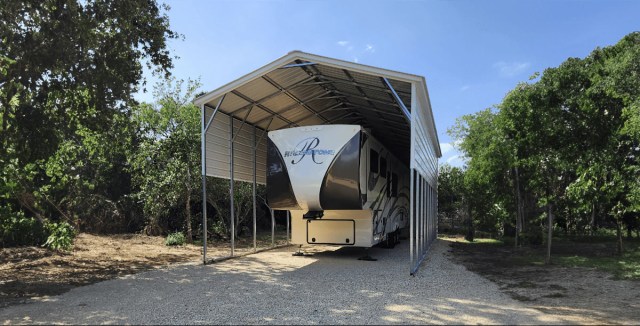
In a boxed-eave roof, on the other hand, metal panels run horizontally. They get their name from how the eaves (the lower edges of the roof) look—they have a finished, “boxed” appearance.
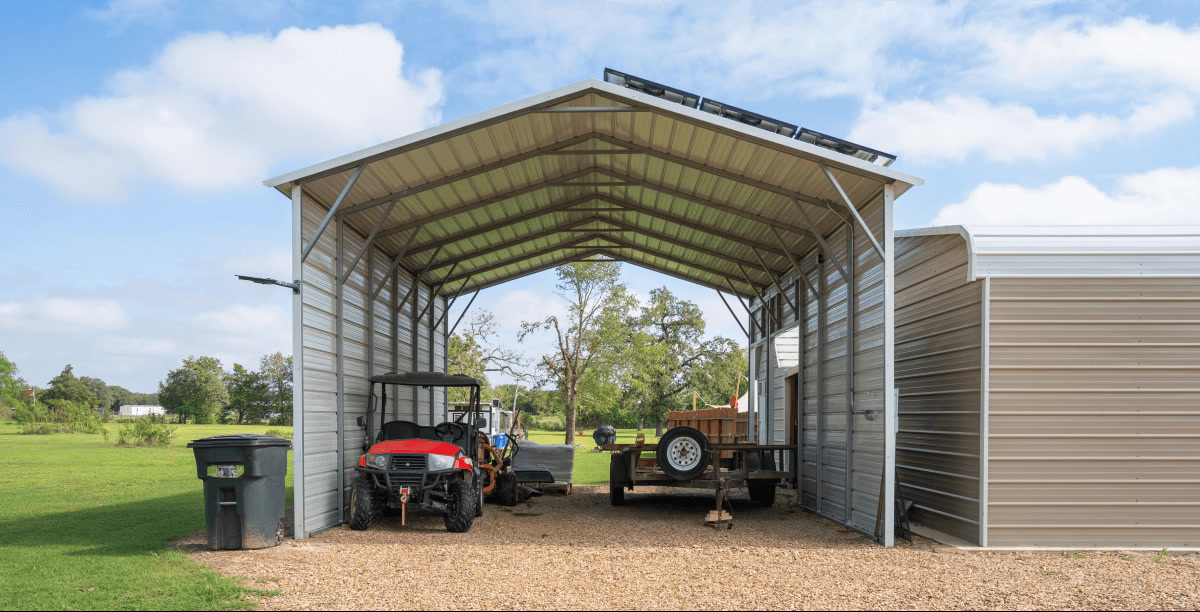
Boxed-eave roofs are typically cheaper than vertical roofs. However, they may not be as good at shedding snow and debris and can sag under heavy snow loads.
Solar Carports
Solar carports are a relatively new type of carport that is becoming popular. According to Time Magazine, roughly 10–15% of the total community and commercial solar installed in the U.S. is found on carports. They have solar panels on the roof that generate electricity to power your home or charge your electric vehicle.
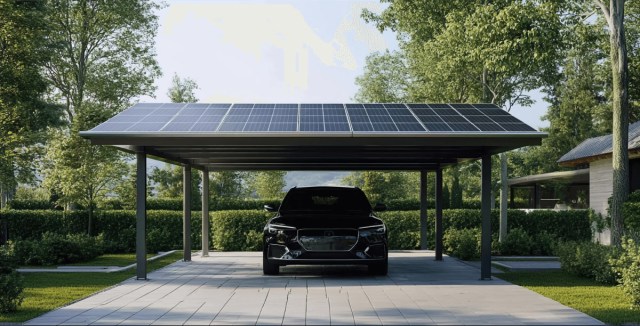
Solar carports are a great way to save energy costs and reduce your carbon footprint.
Carport Building Material Types
Apart from different styles and placements, carports also come in various materials like metal, wood, and fabric. Each material has its own pros and cons, so you’ll need to choose the one that’s right for you.
Metal
Metal carports are the most common and durable type of carport. They can better protect cars from harsh weather conditions than fabric versions but are more expensive.
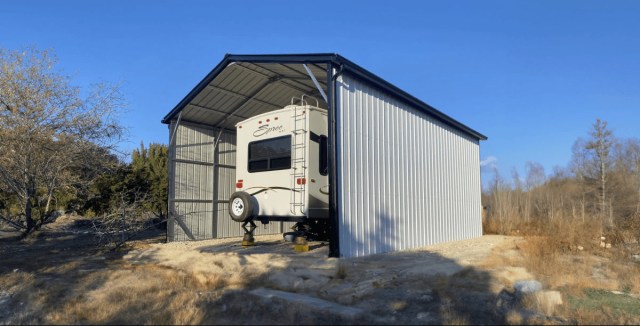
That said, steel carports make up for upfront costs with low maintenance requirements over time.
Pros
Cons
Pros
- Most durable. Metal carports are very strong and can withstand high winds, heavy snow, and even hail. This makes them a good choice for areas with severe weather.
- They need little maintenance. Metal carports don’t need to be painted or sealed as frequently as other options.
- Resistant to most elements. Metal carports are resistant to rain, snow, fire, termites, and rot. This makes them a good long-term investment.
Cons
- More expensive than fabric carports. Metal carports are typically more costly than other options like fabric carports. However, they are also more durable and require less maintenance.
Timber
The main benefit of a wooden carport is its attractive look. While not as durable as metal, timber can still adequately protect your vehicles from rain and snow.
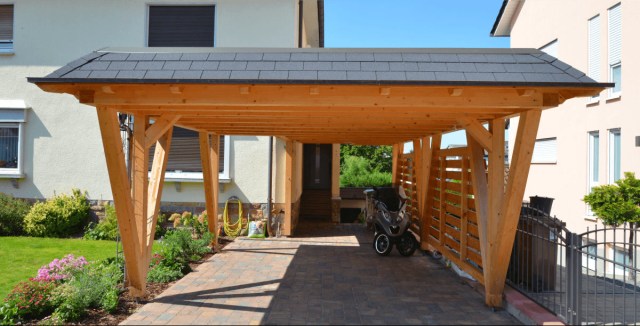
Wooden carports are the most expensive type of carport, too. Protect your wooden frame from rot, termites, and temperature expansion by performing regular upkeep, such as cleaning its surfaces.
Pros
Cons
Pros
- Medium durability. Wooden carports are pretty durable, but they require more maintenance than metal carports.
- Timeless design. They have a classic look that can complement many homes.
Cons
- Most expensive carport type. Wooden carports are typically the most expensive type of carport you can build.
- Susceptible to rot and pests. If not properly cured and maintained, they can be damaged by rot, termites, and other pests.
Fabric
Fabric carports aren’t as durable as metal or timber options but are more affordable and lightweight. They’re also often portable, meaning you can bring them on vacation for picnics or when you go camping.
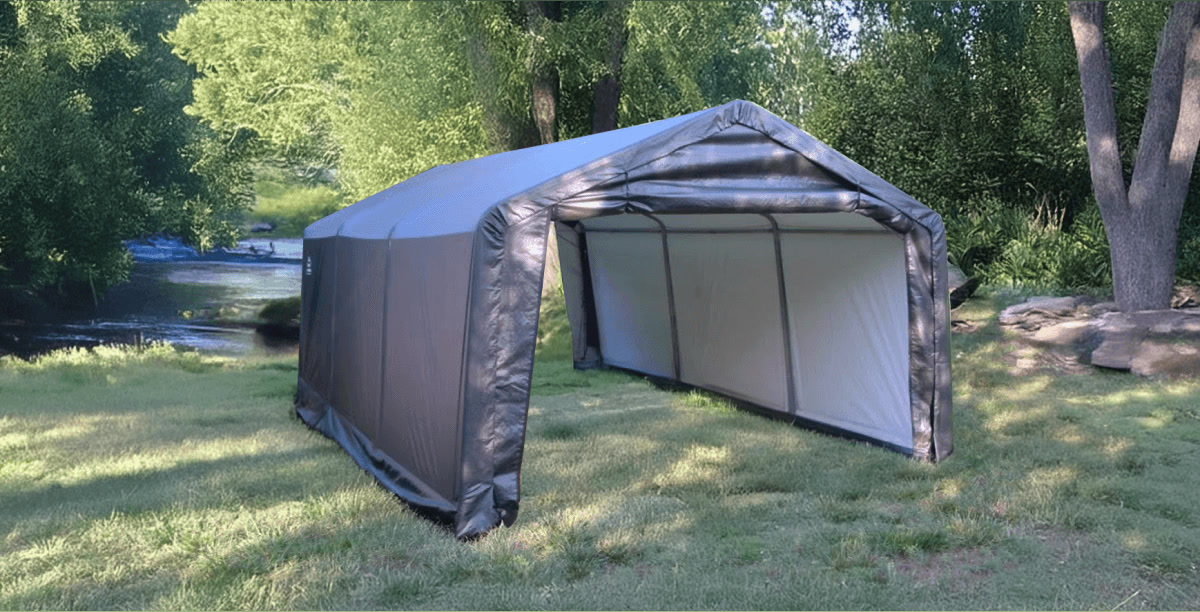
Since they’re less durable, fabric versions fare better in locations that don’t experience snow or extreme winds.
Pros
Cons
Pros
- Often portable. Fabric carports are often portable, making them a good option for people who move frequently or who need a temporary shelter.
- Least expensive. Fabric carports are the least expensive type of carport.
Cons
- Least durable. Fabric carports are the least durable type of carport. They’re not a good choice if you frequently deal with harsh weather.
- Weak against snow and extreme winds. Fabric carports can be damaged by heavy snow and strong winds.
What Sizes Do Carports Come In?
Carports come in various sizes to accommodate different needs. You can find carports for a single car or even large enough for multiple vehicles or an RV.
Typical sizes range from 12′ to 24′ wide, 20′ to 40′ long, and 9′ to 16′ tall at the lowest part of the roof. However, there are also wider options if you need more space.
Here’s a table with some of the most common carport sizes and our recommendations so you get the most out of your carport:
| Carport Type | Standard Size (W x L) | AFO’s Recommended Size |
|---|---|---|
| 1-car carport | 12′ x 20′ | 12′ x 20′ |
| 2-car carport | 24′ x 20′ | 24’ x 24’ |
| 3-car carport | 36′ x 20′ | 36′ x 40′ |
| RV or motorhome carport | 20′ x 40′ | 36′ x 40′ (or larger) |
Benefits of a Carport
You can use carports to shelter cars, boats, trucks, and RVs. You can attach them to homes, though they can also be standalone structures. Carports might have two side walls or none at all.
Some of the benefits of a carport include:
Easy Installation
Carports are relatively easy to install, especially compared to garages. This is because they are typically made from prefabricated components and sold as carport kits designed for quick assembly. In many cases, you can even install a carport yourself with the help of a friend or two.
Weather Protection
These covered structures protect vehicles from various weather conditions, including rain, hail, UV rays, heavy wind, and snow. This protection can extend your vehicle’s life by preventing damage from the elements.
Multipurpose Use
Carports can be used for more than just parking your car. They can also double as a shady relaxation space during hot summers, storage space, or patio area cover. For more security, you can upgrade your carport with a garage door.
Portable
Some carports are easy to fold and set up anywhere, meaning you can take them with you when you move. This is an excellent option for people who rent or live in areas with frequent storms. Portable carports are also a good choice for people who want to take their shelter with them on camping trips or other outdoor adventures.
Customizable
Carports are highly customizable. They come in a variety of colors and styles to fit your needs and match your home. You can choose from different types of roofs and materials, and you can enclose your carport either partially or fully, depending on your needs.
Cost-Effective
Carports are less expensive than building a garage, making them a more cost-effective alternative to basic car shelters. This is because they use fewer materials and require less labor to install.
Drawbacks of Carports
While carports offer many benefits, they also have a few drawbacks to consider:
Limited Security Features
Carports offer less security than garages because they are typically open on all sides. That means your car is more vulnerable to theft and vandalism. However, you can add security features to your carport, such as a garage door or security cameras, to help deter criminals.
Limited Protection From Severe Weather
Carports offer less protection from severe weather than garages because they’re not fully enclosed. If you live in an area with frequent storms, you may want to consider a garage instead of a carport.
Potential for Less Aesthetic Appeal
Some people find carports to be less aesthetically appealing than garages. However, this is a matter of taste, and there are many different styles of carports available, so you can find one that complements your home.
How Much Does it Cost to Build a Carport?
According to HomeGuide, in the US, 1-car carports cost an average of $2,000–$7,000 to build, while 2-car carports cost $3,200-$12,000. Homeowners will typically spend around $6,000 on the carport they choose to build. However, prices vary widely depending on size, style, and customization options.
At Alan’s Factory Outlet, open-sided metal carports start at $1,295 installed, and prices for other standard carport sizes reach $4,995, while triple-wide metal carports don’t exceed $6,995.
| Size | Price Range |
|---|---|
| 12’ x 20’ | $1,295–$1,695 |
| 20′ x 20′ | $1,695–$2,395 |
| 30′ x 25′ | $3,695–$4,295 |
| 20’ x 40’ | $4,095 (Vertical roof only) |
| 24’ x 40’ | $4,995 (Vertical roof only) |
Enclosing the structure generates additional costs. These costs depend on the carport’s size, what parts you decide to enclose, and the material you choose.
Here’s a brief table showing how much you can expect to add to the base cost of construction if you enclose the two sidewalls.
| Side Wall Size | Added Cost to Enclose Both Sides |
|---|---|
| 20’ Long x 8′–9′ Tall | $660–$1,020 |
| 25’ Long x 8′–9′ Tall | $780–$1,200 |
| 40’ Long x 8′–9′ Tall | $1,290–$,1,890 |
If you decide to enclose the end walls as well (for a fully enclosed carport), you’ll incur additional costs. Here’s a rundown of the added costs.
| End Wall Size | Added Cost to Enclose Both Ends |
|---|---|
| 12’ Wide x 8′–9′ Tall | $685–$1,085 |
| 20’ Wide x 8′–9′ Tall | $940–$1,540 |
| 24’ Wide x 8′–9′ Tall | $1,200–$2,000 |
So, you can expect to pay anywhere from $1,295 for a small, simple one-car carport to about $8,885 for a fully enclosed 24’ x 40’ four-car carport. Keep in mind, though, that a “fully enclosed carport” is basically a garage—all you’d need to do is add a roll-up door.
Try our 3D Builder tool and see what your custom carport (or garage) would cost.
Does a Carport Increase Home Value?
While some carports likely won’t increase the value of your home, a quality carport with a modern design can increase curb appeal to potential buyers. Just make sure your carport makes functional sense for your property and is well maintained.
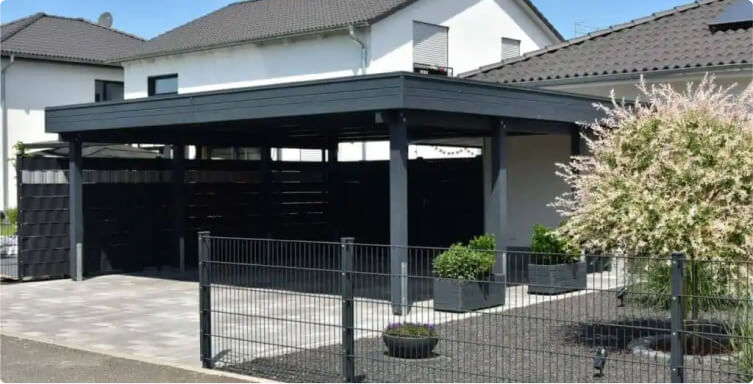
If your metal carport is worn out, rusted, or doesn’t match the style of your home, it could instead be perceived as a burden for buyers. Keep this in mind if you’re investing in one to increase your home value.
Permitting and Regulations
Permitting is always an essential factor to consider when adding structures to your home.
Whether you need a building permit to install a carport on your property can depend on a few factors. Generally, smaller, freestanding carports might not require a permit, especially if they’re considered temporary structures.
However, larger carports, those attached to your house, or those in areas with strict building codes will likely require a permit.
It’s always best to check with your local building authority before starting your project.
Carport vs. Garage: Which Is Better?
Which is best: a garage or a carport? It’s not really a one-size-fits-all situation. It all depends on your needs and budget.
Carports are better than garages in terms of portability, affordability, and DIY construction. They’re probably the best choice for those looking to save as much as possible on a shelter for their vehicle. But garages are usually better for security and protecting your vehicles and valuables from the elements.
If you’re still unsure, the following section goes more in-depth to help you decide which is the best choice for you.
Choosing the Best Option For You
So, you’re thinking about getting a carport but aren’t sure it’s the right choice for you? Don’t worry. We’re here to help! Let’s take a look at some situations where a carport might be the better option, and some where a garage might make more sense.
When to Choose a Carport Over a Garage
A carport could be the right choice for you if you prioritize:
- Fast installation: Since they have simpler structures with natural ventilation and open walls, installation and securing permits for a carport is easier and quicker than with a garage.
- Energy efficiency: Carports are also more energy-efficient than garages since they don’t feature electric door openers, such as chain and belt drives or lights.
- Affordability: Carports are a more affordable garage alternative that’s simpler to construct and requires fewer materials.
When to Choose a Garage Over a Carport
That said, a garage could be the best choice if you’re looking for:
- Security: Garages generally better protect your vehicle from the elements and intruders since they provide an enclosed space with four walls.
- Storage potential: Use garage storage hacks like installing shelves, hooks, and pegboards to improve organization and increase storage capacity.
- Alternative uses: Garages are easier to transform into additional living spaces, recreational areas, or workshops since they have outlets and walls to protect from all kinds of weather.
For more information on the pros, cons, and differences between the two structures, check out our full guide on carports vs. garages.
Converting a Carport into a Garage
One of the great things about carports is that they don’t have to be permanent solutions. If you start with a carport and later decide you want a garage, you can often convert a carport into a garage. This can be a great way to get the shelter you need now while still having the option to upgrade in the future.
Choosing a Metal Carport From Alan’s Factory Outlet
You’ve got your answer to “What is a carport?” and you have all the information you need to decide if this is what you need.
If your answer is yes, Alan’s Factory Outlet is the best place to buy your new carport.
Check out typical carport prices to put a solid budget together. Once you feel prepared and know your options, you can either build a carport from the ground up or browse our collection and find one that fits your needs.
Alternatively, use our 3D carport builder today to create a custom design.
Frequently Asked Questions
Have lingering carport questions you need answered before making a decision? Check out these frequently asked questions to find the answer you’re looking for.
How long do carports last?
Carports can last between 20 and 30 years. However, the materials you use, the garage’s size and type, your location, and how often you perform maintenance will determine their lifespan.
What’s the difference between a garage and a carport?
A garage is a fully enclosed structure with walls, a roof, and a garage door. A carport is typically open on the sides and may or may not have walls. Garages also frequently include a concrete slab as a foundation, while carports don’t.
What is the purpose of a carport?
The main purpose of a carport is to provide shelter for your vehicle from the sun, rain, snow, and other elements. Carports can also be used for storage or as a covered area for outdoor activities.
How expensive are carports?
Prices range from roughly $1,000 to $9,000 depending on the carport’s size (from one- to four-car carports), style, type of roof, and whether you choose to enclose any of the structure’s sides and ends.
